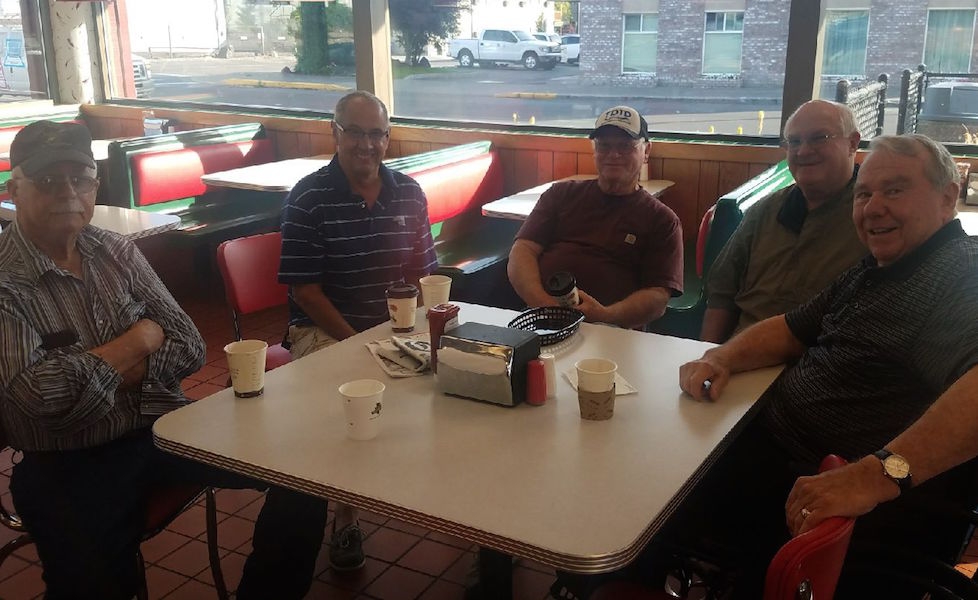Every morning a group of business and goverment workers meet at The Dalles Burgerville. They call themselves the “Right Wing Cafe.”
The Dalles — As the sun rises over the Columbia River, burning away morning fog, a handful of civic leaders convene in the local Burgerville.
They call themselves the “Right Wing Cafe,” a moniker that refers not to a cafe but an amicable gathering of mostly conservative men (and the occasional woman) who meet daily at the fast food joint for breakfast.
The group includes some political heavy hitters. On a recent morning in May, city council member Russ Brown stopped by. So did a former Irrigation District chief, a successful wheat farmer and a county official, who asked not to be named.
A Wasco county commissioner, Rod Runyon, skipped this week to participate in “Run for the Wall,” a cross-country pilgrimage in which 300 motorcyclists tow a Vietnam memorial replica to Washington, D.C.
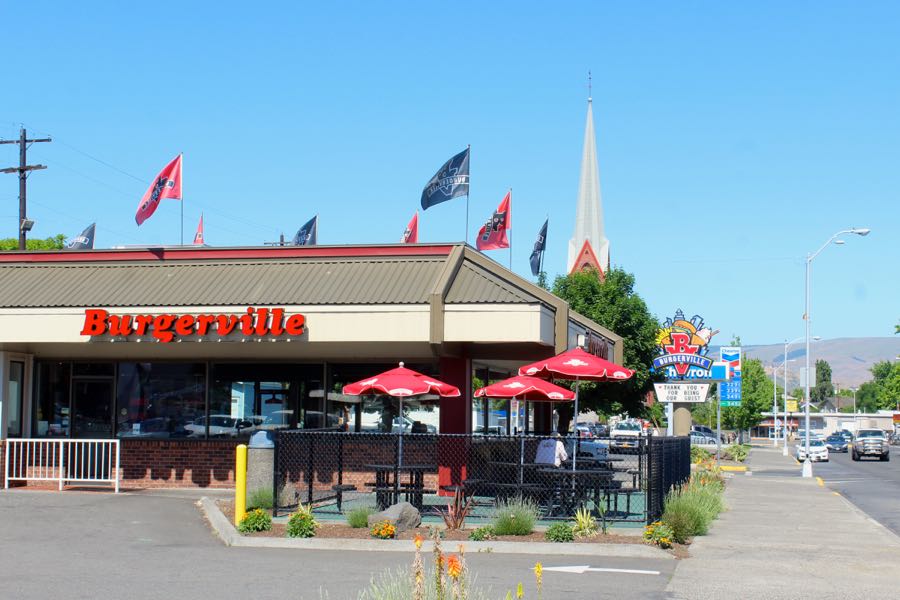
The mix of retirees and middle-aged professionals occupies the center of the restaurant, as if they own the place.
In a way, they do. Five to ten Right Wing Cafe members meet here at 7 a.m., seven days a week. They’ve been meeting since 1975, tracking The Dalles as it evolves from a blue collar aluminum town to a high-tech outpost. The group has lost some original members and gained some new ones. But the Right Wing Cafe has endured, and so has an attitude that is often missing from today’s polarized debates.
“They have a mix of different views,” says Brian Lauterbach, a commercial real estate broker who works with one of the attendees. “But at the end of the day they’re okay being friends.”
On this Tuesday morning, realtor Mike Woodside reclines across the table from a third generation wheat farmer, “farmboy” John Fulton. To the right of Woodside, in a wheelchair, sits Bill Booth, a retired insurance professional who owns a quarter stake in the luxury Stephanie Inn on the coast.
There is token female representation: Burgerville assistant manager Amanda Watson. There’s also a token liberal, John Hutchison, a retired healthcare executive.
The group sips coffee out of paper cups. People trickle in and out, greeted and chased by friendly jabs. “If you don’t like being picked on, don’t sit in,” says Runyon, reached from his latest stop in Lynchburg, Virginia. “People drop in now and then that don’t last.”
“If you don’t like being picked on, don’t sit in,” Runyon says. “People drop in now and then that don’t last.”
The morning chatter revolves around trucks and reforming the College football bowl game system. At one point the bespectacled and baseball-capped former irrigation chief, “waterboy” Mike Richardson, unfolds the Oregonian, and starts reading about the latest development connected to the Eagle Creek fires.
“All right,” he says, “teen forced to pay $36 million in restitution.”
The Right Wing cafe members call the court-ordered penalty outrageous. “He did the same thing we’ve all done at that age,” says Fulton. The teen will never finish paying, Richardson says. ” hope he turns into Bill Gates.”
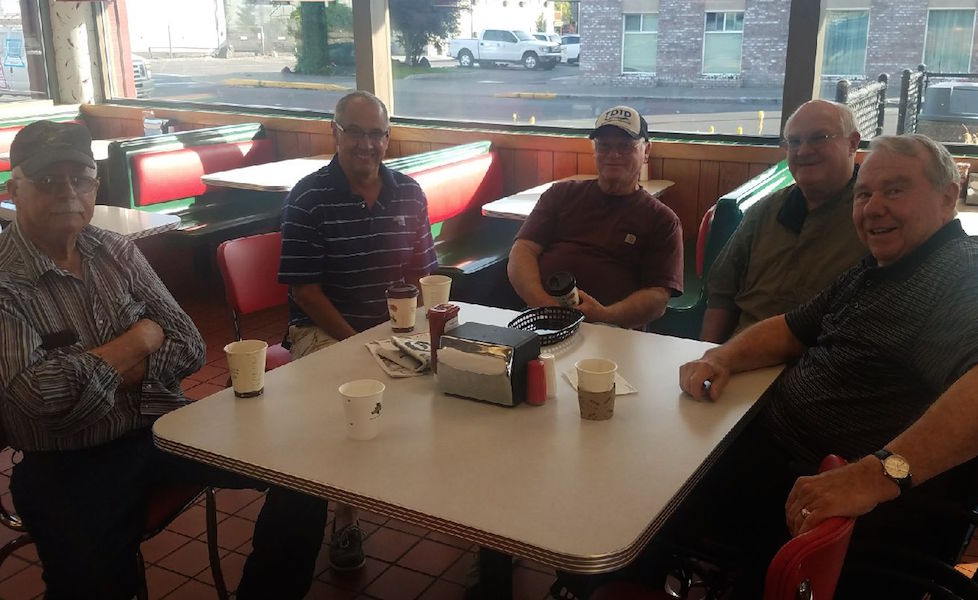 The Breakfast Club: From left to right, Right Wing cafe members John Fulton, Bob Fulton, Mike Richardson, Mike Woodside and Bill Booth
The Breakfast Club: From left to right, Right Wing cafe members John Fulton, Bob Fulton, Mike Richardson, Mike Woodside and Bill Booth
Talk turns to Gov. Kate Brown’s special session the previous day, when she delivered a small business tax break. The county official shows an iPhone video of SEIU protesters chanting “tax the rich.” His lobbyist friend shot the video while chuckling from the gallery above.
There was a real cafe, once.
In the 1970s Johnny’s Cafe catered to a steady stream of blue-collar workers who smelted aluminum, paved freeways and erected dams. The customers kept coming, and the door stayed open, 24 hours a day. The owner, Alvin Clark, forgot where he left the front door key.
Woodside and company drank at the Elks Club until 2 a.m. then stumbled into Johnny’s, where they put down another few beers until dawn. Sometime around 1975, their early morning chat became known as the Right Wing Cafe.
From that time on, the original 10 or so men met nearly every day. They gained a few members, lost a few others. Two died: a veterinarian and Meredith Dean Van Valkenburgh, a former Wasco County Deputy District Attorney.
The meeting time never changed, but the venue did, several times over. Johnny’s passed to new ownership and became a Petite Provence, the Portland-based French bakery chain.
That was too upscale for the Right Wing Cafe, so the men walked down the street to the Pancake House. Then the Pancake House burnt down. The group finally settled on Burgerville because it could accommodate Booth’s wheelchair. Every morning at 6:30 a.m. one of the men rolls Booth into a van and drives him to the meeting.
The attendees gave back to Burgerville for the hours they spent there with more than daily coffee purchases. The Cafe funds a Burgerville employee’s annual cancer walk. They recently handed another worker $400 to travel to Ohio to scatter her father’s ashes.
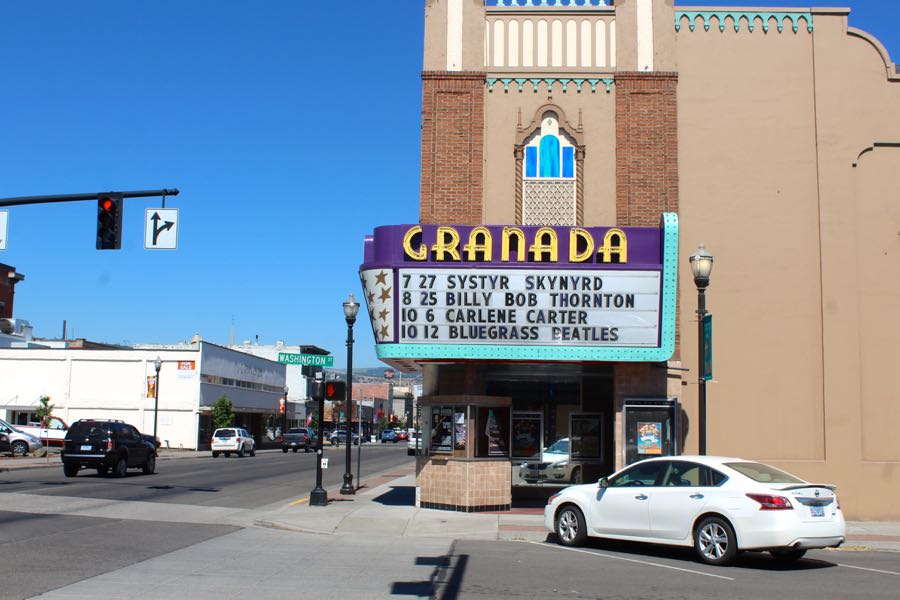 The recently restored Granada theater in The Dalles
The recently restored Granada theater in The Dalles
From the windows of various downtown eateries, the Right Wing Cafe watched the town evolve. Blue collar jobs gave way to high-tech work in defense and clean energy. Out went the aluminum smelters. In came 400-foot-tall wind turbines, an integrated 3D manufacturing center at the port and Hood River-headquartered defense contractor Insitu, whom Hutchison calls “the drone people.”
Google built its first data center in the Dalles in 2006. Two more followed, for a total investment of $1.8 billion and 200 jobs.
New arrivals gobbled up small lots downtown and affordable homes. A crop of new cafes, brewpubs and restaurants energized the downtown. The housing inventory plummeted to about 35 listings, Woodside says. “Everything’s filled,” says his counterpart on the commercial side, Lauterbach. Everything except for a few large tracts — the former sites of JC Penny, The Chronicle and the Griffith car lot.
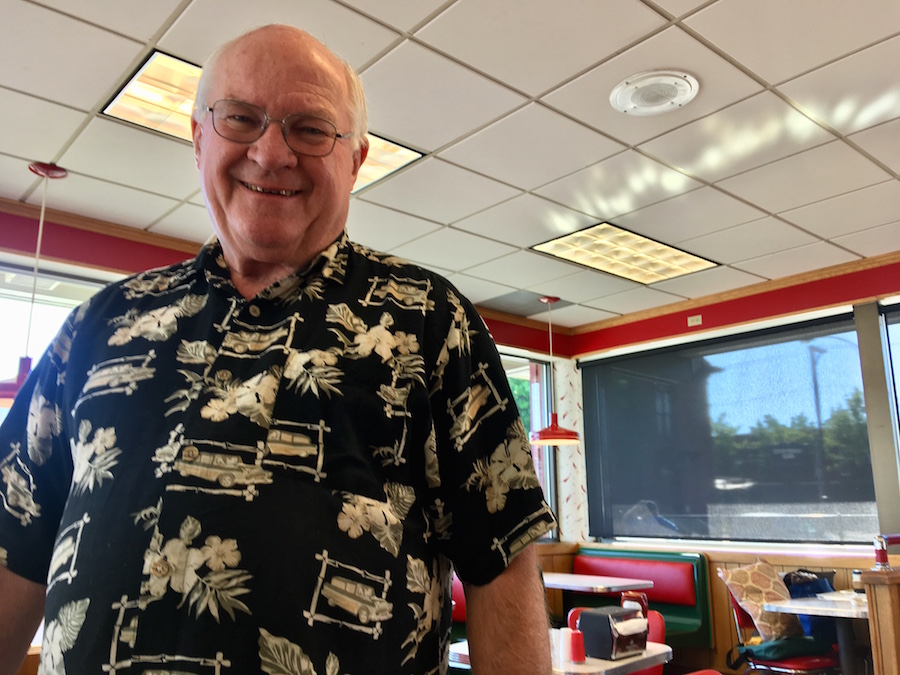
Realtor Mike Woodside
The money-conscious conservatives at the table lament rising housing costs and taxes. The school board is mulling a $235 million bond to fund four new schools at five-year intervals. On that issue Woodside feels ambivalent. “I feel like we’re handing them a blank check,” he says. “But we need it.”
A proponent of the school bond visited several meetings. Philip Mascher, a realtor who bought his home in The Dalles from Woodside, says he expected a sound rejection of the tax increase. To his surprise, half the group supported the measure. (Disclosure: Mascher is a friend of the editor of Oregon Business.)
“I was amazed to see how many different opinions there were,” says Mascher, a former marketing professional who moved to the Dalles from Portland last fall, “and how much discussion and good questions.”
After most of the group exits Burgerville, Hutchison and Woodside saddle up for another of their verbal jousts.
Hutchison arrived in the Dalles in 1998, around the time the aluminum plants shuttered. He discovered the Cafe through Bob Pallari, the retired chief of Legacy Health. Pallari introduced Hutchison to a mutual friend, Booth, who invited him to Burgerville. Hutchison slipped in, the way he tells it, before the other men smelled a liberal.
He’s been there ever since.
In high school, anticipating the Vietnam War draft, Hutchison enlisted as an Air Force clerk typist because he “didn’t think shooting a gun was a skill set I wanted.” He earned a master’s of social work at Portland State University. After retirement, he moved into grant writing for the local housing authority. He drives a Volkswagen Euro Van.
Hutchison fancies himself the knight in shining armor defending the left. He stays for a half hour each morning and drinks an iced coffee. But no serving of caffeine matches the jumpstart he gets from Woodside, with his “bizarre” political feelings and daily “diatribes.”
Woodside knows it. Referring to Hutchison, he says, “I get him so fired up he turns purple.”
“I was amazed to see how many different opinions there were,” says Mascher, who moved to the Dalles from Portland last fall, “and how much discussion and good questions.”
Woodside bleeds pure red. Like everyone else at the table (except Hutchison) he voted for Trump. In fact, he’s never voted for a Democrat. “If Watergate happened under Obama, they wouldn’t have covered it,” says Woodside, except, perhaps, for Fox News. He credits Trump for the booming economy and the possibility of detente with North Korea, (a proposed meeting with that country fell apart the following day).
On this particular morning, the subject of debate is just how far right Woodside leans. “I’m middle of the road,” he says. It’s true for social issues. He doesn’t oppose gay rights. Abortion is wrong, he maintains, but it’s equally wrong to direct women what to do with their bodies.
“You’re not,” Hutchison fires back. “You’re an extreme right-winger.”
“I’m not,” says Woodside. “I hate the far left; I hate the far right.”
Eight years ago, a few other attendees joined by accident. A wall, atop which ran a toy train, divided the Burgerville shop. On one side sat the Right Wing Cafe; on the other, Rod Runyon and a couple friends. One day the wall came down, and the two tables came together.
When Runyon walks through the door, everybody shuts up. He holds the most political clout, by far. He spends most of the time listening and learning from the cafe members, who function as a kind of focus group for county politics.
If someone raises an issue he finds relevant, Runyon talks to county officials about it and comes back the next morning with an answer. “If I say things,” he says, “people take it seriously.”
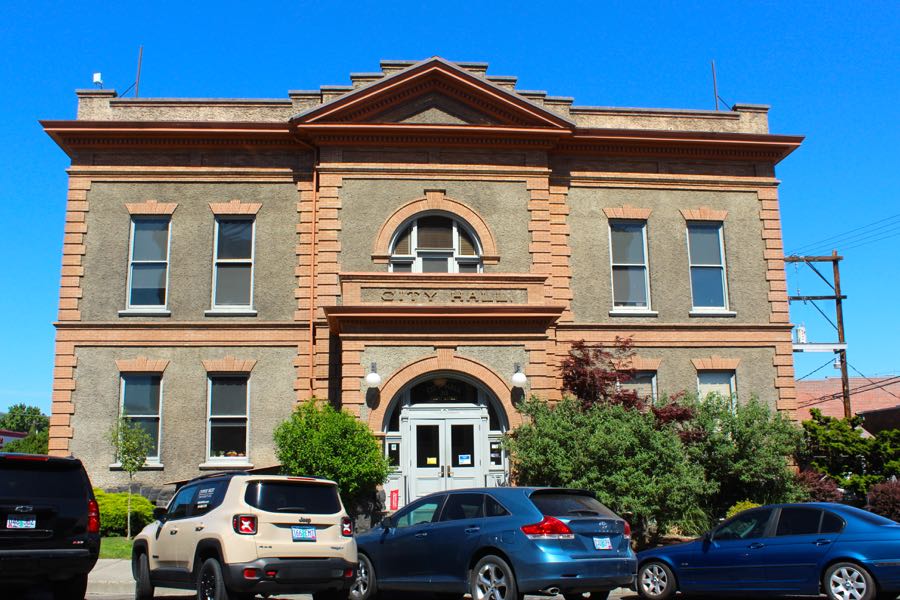 The Dalles City Hall
The Dalles City Hall
At first, the group’s politics mirrored those of the city, and the county. Gradually, due in no small part to the tech influx, blue spilled into the red pot. Nowadays, a line divides Wasco County’s 16,867 registered voters clear down the middle. Just over half the county voted for Trump, 41% for Clinton, similar to the Romney-Obama tally. Runyon recently lost his seat, which he held for eight years, to the left-leaning Kathy Schwartz.
The group views the election result as a sign of changing times.
Liberals are making headway at Burgerville too, as two of the chain’s Portland stores recognize the nation’s first fast food union. Woodside views the Burgerville union the way he does any other. Unions played a critical role in securing basic worker protections at the turn of the century, he says. Then employers “stepped up to the plate” with benefits that rendered unions superfluous. He says The Dalles Burgerville employees, Watson for one, don’t want a union.
The middle-of-the-road political sentiments in the city and county mirror the opinions at Right Wing Cafe. “I see a line down the middle of the table,” Runyon says, “leaning a little more to the right.”
Even Hutchison boasts a few conservative credentials. He served as a healthcare policy analyst under Vic Atiyeh, Oregon’s last Republican governor. He knows business. He climbed the healthcare industry ladder, ending up as Vice President of Provider Relations at Blue Cross Blue Shield.
“It gives me a different perspective,” Hutchison says. “I’ve never been exposed to that kind of thinking.”
Yet moderation does not define the morning chats. Hutchison says attendees never stray into racist or homophobic territory, but they enjoy bashing liberals. Mascher, who describes himself as “an infrequent visitor” to the cafe, says he keeps his left-leaning politics to himself. “I know if I made my views known,” he says. “I would paint a huge bullseye on my head.”
The Right Wing Cafe may live up to its name. But it also offers a bridge across the aisle. In a nation where congressional spats metastasize into government shutdowns, Hutchison can sit down at a table in Burgerville, debate his political foils and leave as a friend.
“It gives me a different perspective,” he says. “I’ve never been exposed to that kind of thinking.” Mascher views the meetings as a “bridge-building experience.”
The same goes for Woodside, speaking from the other end of the political spectrum. The debates with Hutchison, whom he respects as “real fair-minded,” recall a bygone era, he says.
“When I was a kid you never even knew what politics were,” Woodside says. “We were all in the middle, and we made the thing work.”
To subscribe to Oregon Business, click here.

